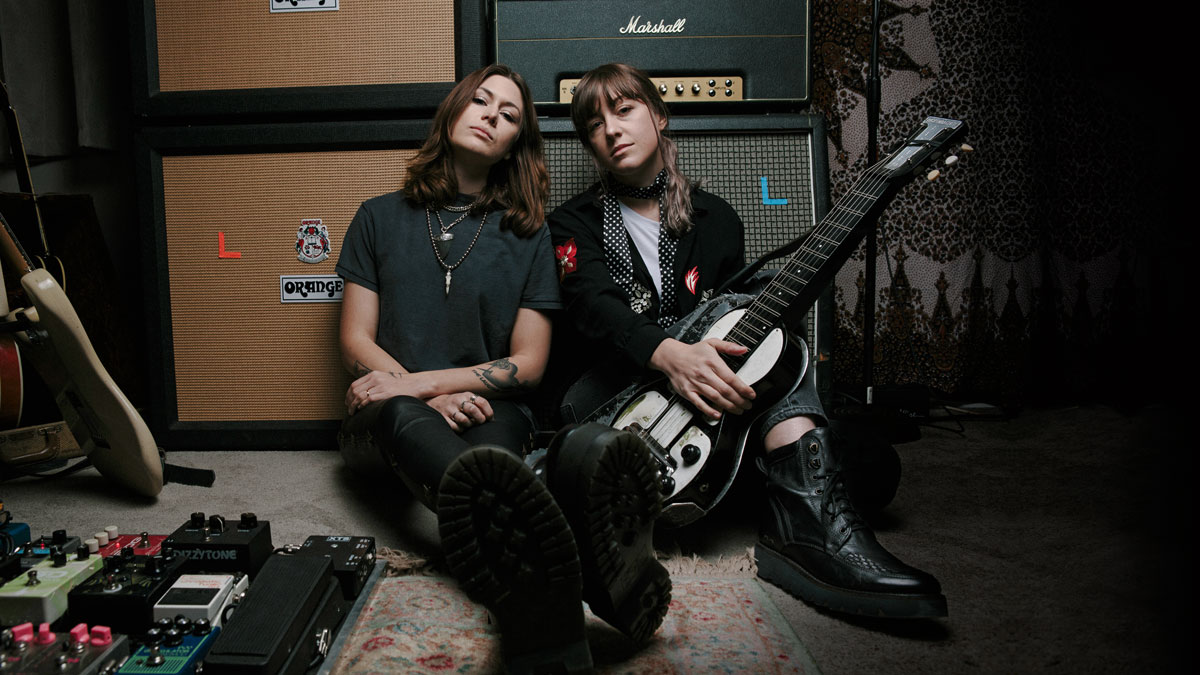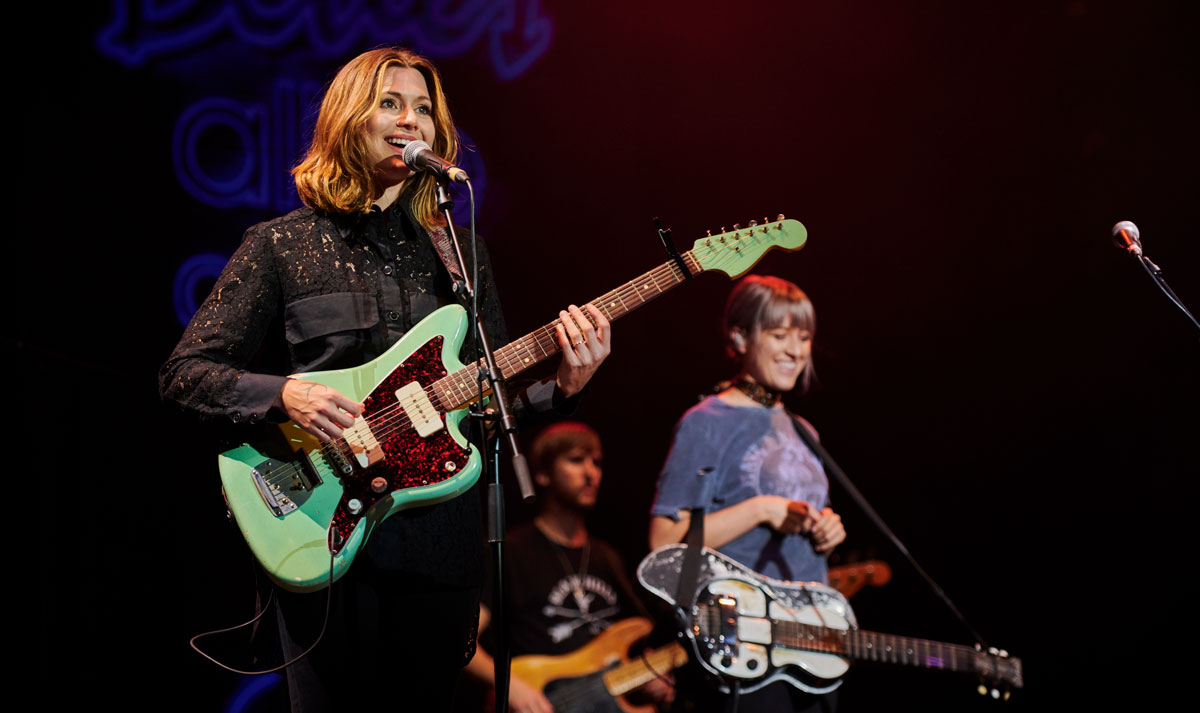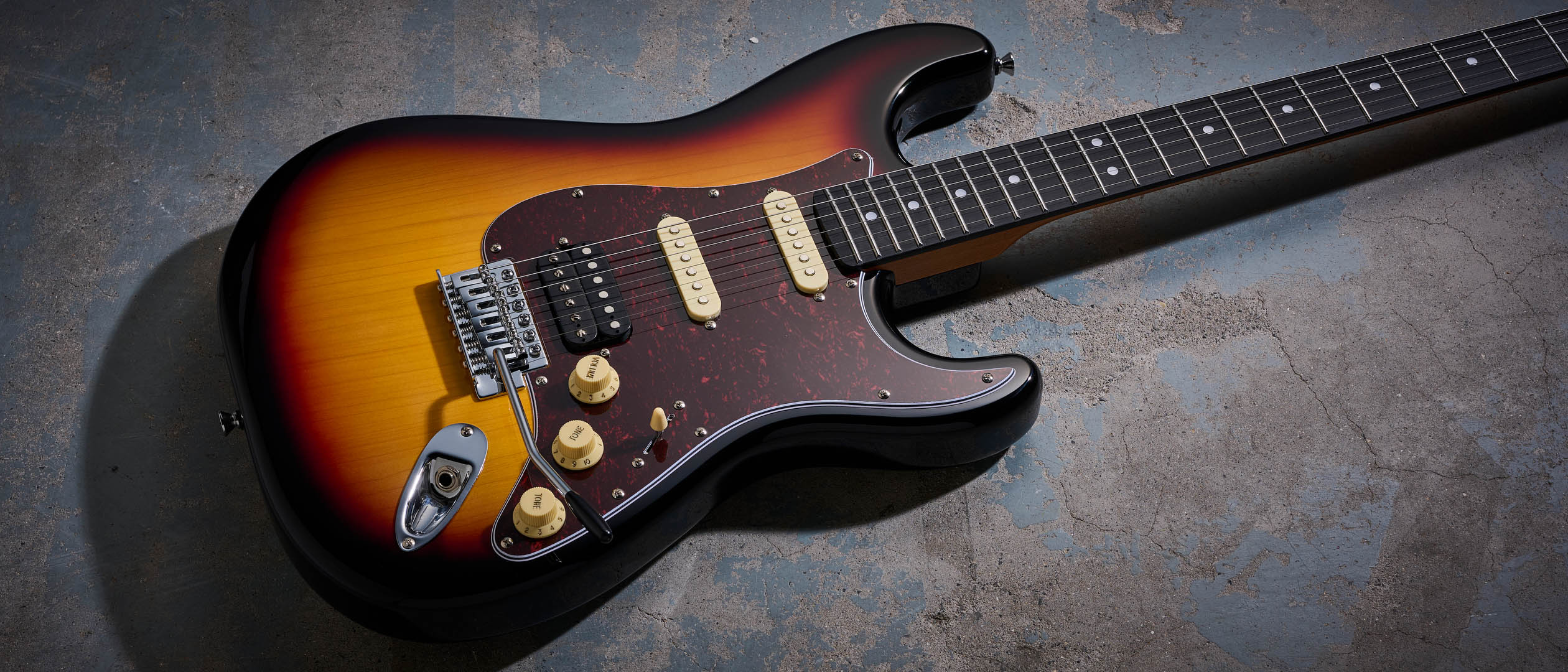Larkin Poe: "We want to take roots American music to new places – and not treat the blues like a time capsule"
The multi-instrumentalist sister duo discuss recording efficiency and the vintage gear that fed into Self Made Man

Larkin Poe might play a rootsy mix of Americana, blues, rock, a soupçon of country in there too - hey, they live in Nashville, TN, it’s mandatory - but they’re so DIY they’d put the punks to shame.
The sisters Megan and Rebecca Lovell have the final cut on everything, and have built this Grammy-nominated force of nature from the ground up, with Megan on the lap steel, Rebecca shouldering a Strat, or maybe a Jazzmaster, both taking a kinetic approach to songwriting and putting their own spin on an art form that can sometimes be too deferential to its history.
Their new album, Self Made Man, speaks to this DIY ethos. Again, it’s self-produced, with the Lovells tracking with long-time engineer Roger Alan Nichols at Bell Tone Recording, in Nashville’s Berry Hill [pop. ~547]. And it compacts the legacy styles of southern roots music into something that’s fresh, vital, and iconoclastic in all the right ways.
As the Lovells explain here, their sound is about finding a new spin on that roots sound, giving it a pop sensibility, and perhaps most importantly, it is about taking the energy of the live show and trying to replicate it to tape. And new spin or not, tracking live with an old 50s Rickenbacker lap steel, Fender guitars through cranked, over-worked vintage Fender combos? That’s pretty darn old-school…
You took a trip to Graceland before making this record. What was that like?
Megan Lovell: “It was a fantastic trip. We had been wanting to go and visit Graceland for a while, and this was my first time. I was not expecting to be so moved by seeing the home of Elvis Presley, and getting to see how he lived, seeing his memorabilia, and seeing his books opened, the passages in the books that he had underlined.
“It was really very special to see that stuff. Also, Memphis is just a music city that has so much history. Playing blues music we love to get to visit Memphis and learn a lot about the blues musician as well. Memphis just has a special place in our heart.”
Get The Pick Newsletter
All the latest guitar news, interviews, lessons, reviews, deals and more, direct to your inbox!
How different is the vibe to Nashville?
Rebecca Lovell: “Yeah, there’s definitely a crossover. They are just a couple of hours apart, but musically there is a big difference in that Nashville is predominantly a country city. Memphis has always been a bit more turned towards the blues, but they are both incredible places.”
It’s great that these places have retained that bond with the music, because in the internet era those geographical bonds can vanish.
We feel so fortunate to identify so strongly with this southern culture
Rebecca Lovell
Rebecca: “Having grown up in the South, I do think that it feels very natural that we had tended towards loving roots American music. It definitely doesn’t get enough credit within the broader commercial field of music as what’s being played and presented on radio.
“Having grown up here in Tennessee, the land of Dolly Parton, and then raised in northern Georgia, where there is a lot of great rock ’n’ roll coming out of Georgia and northern Florida - and even into South Carolina, all the soul singers who were coming out, James Brown, the R&B world - I do think historically it is embedded in the geography.
“We feel so fortunate to identify so strongly with this southern culture, this southern music, and hopefully serving as a jumping off point for our generation to fall in love with this music as well.”
You are the custodians of this music now, and you are not afraid to have your own take on it. Which is only right, music shouldn’t be approached with silk gloves and too much reverence.
Rebecca: “We love roots American music, and not putting it behind glass, and giving it the opportunity to breathe, to go to new places, feels very important. To keep that lifeblood kicking through the music and make sure it’s got a pulse, ‘cos the last thing we want to do is treat blues music, bluegrass, or America like a time capsule. Certainly not.
“It has always been a focus of Megan and myself to take this music and hopefully give it some new twist or tweak with the production, and coming up with songs with more of a taste for pop-song structure and just trying to play around and experiment and make something that feels very authentic to us.”
Does being family help you make braver creative decisions?
There is so much non-verbal communication between the two of us. I think that’s what makes us work, especially in the studio when we are self-producing
Megan Lovell
Megan: “Our relationship as sisters is the axis upon which everything turns. We are sisters first. Our relationship is the most important thing. There is a lot of trust between us. That trust is so important for songwriting. Rebecca is the main songwriter. She brings the songs to me and I then add to the story.
“But, yeah, our relationship as sisters is so important. It’s our relationship onstage. It’s the way that we connect with each other. There is so much non-verbal communication between the two of us. I think that’s what makes us work, especially in the studio when we are self-producing. We can move really quickly towards a shared goal, almost without speaking. We kind of know what each other is thinking.”
Rebecca: “Yeah, absolutely, that’s definitely something that we have learned through the years, to have faith and have trust in each other. And to not feel too precious about our ideas, and to let the best idea win. That takes putting away the ego, if possible. Which is certainly a hard thing to do on occasion!”
You two never look like you feel pressure at all. Whether you’re on a big stage or shooting video, you always seem at ease.
Rebecca: “I do think, as sisters performing together, that pressure is in someway doubled. I think it is quite understandable when you see a lot of sibling bands tearing each other apart or always at war, because you are placing a lot of stress on that relationship - a relationship that goes back to the same womb! - and with someone who knows you super-intimately, all the quirks and tweaks that make you who you are.
“In our early 20s, we did a lot of work together on our relationship because we were fighting and having troubles, just in response to a lot of the pressure of performing. It could happen in a bar, or if you are playing the Islington Town Hall with 800 people in London, regardless of where you are, that pressure does exist. We’ve learned to deal with it.”
You can’t take it too seriously. It’s got to be fun.
Rebecca: “We really do want to have fun with what we are doing, and be joyful in the way that we approach music, and not take it so serious so that the pressure does not get in the way of being really vulnerable or being authentic. I think it’s something that takes commitment, committing to letting it be - what’s the word I’m looking for?
We have spent so much of our lives working towards and working for, and so [it’s about] letting ourselves really enjoy our music
Rebecca Lovell
"[Pauses] To not let it be our job. We have spent so much of our lives working towards and working for, and so [it’s about] letting ourselves really enjoy our music, not getting caught up in how many tickets have been sold or how many records are moving.”
There is a sense of communal expression in these songs. What have you learned from playing in front of people? How much of an influence is audience interaction?
Megan: “Audiences have certainly had an impact on the music and we had toured for two years straight leading into making Self Made Man, and it was really intense touring. We were touring in a way that we had never toured before, and having experiences that we had never had before like entire tours selling out, and having people showing up knowing the lyrics to the songs, and really belting them back at us from the audience.
“That certainly had an impact on the way that we viewed songs. The community aspect of music is certainly important to us. Writing for this record, we were imagining these songs as not just our personal babies. They cease to belong only to us and belong to the people who listen, and somehow make the songs something bigger.”
…And help them evolve. Are the songs fully formed by the time you hit the studio?
Rebecca: “When we get into the studio, things work pretty seamlessly. We’re kinda like a lean, mean killin’ machine! We are big believers in demoing songs out before getting into the studio, typically because artists like us are recording on a shoestring budget and you don’t have a lot of time to mess around and stretch out.
“Being able to have a strong sense of which song we are feeling pretty passionate about, that is usually the first step. Getting the best material together that feels cohesive, and feels like it’s got a story arc to the song. Once we get into the studio we are able to stretch out and expand the arrangements.”
It sounds really alive. Is that how you track?
Rebecca: “We try to keep everything that we are recording in the studio as live as possible. So typically we’ll come in with drums already programmed. We cut the guitars really live, really loud, and we limit the number of vocal takes that I am allowed to do to keep the humanity, and to make sure there is some spontaneity and life in the album.”
The studio can bring out some really strong and heightened emotions because you are putting such a focus on yourself
Rebecca Lovell
Again, that sounds fun…
Rebecca: “Yeah, it is typically a fun process! I do think the studio can bring out some really strong and heightened emotions because you are putting such a focus on yourself, and it is easy to want to pick yourself apart in the studio.
"But that’s why it is really nice to have a trusting relationship, because we are able to move through the tough moments - especially as producers. We are wearing a lot of hats in the studio. We are really proud how this album came out.”
Did it take you long?
Megan: “Really only a couple of weeks in the studio.”
Rebecca: “It took maybe two months from writing to a complete album sitting in our hands.”

That’s insanely quick.
Rebecca: “We wrote the record the last few weeks of October and then we were not able to get into the studio until December. During the winter I caught this really nasty cold that I couldn’t shake, and I wasn’t able to speak for a couple of weeks when we were meant to be recording. Looking back, we were really stressed because we were going to hit the road really hard.
“We had a tour starting in April. We felt under the gun trying to get this record finished. We had to tweak and twist our schedules around my voice. It’s really funny to think of all that and now, here we are! [Laughs] In a room, and none of the touring that we had anticipated is actually happening, so we had all the time in the world!”
You produce yourselves. You are almost 100 per cent DIY. What do you look for from the engineer?
If you have too many cooks and if you have too many people who are trying to push the direction of the album, you end up with a woolly-headed thing that doesn’t really sound like anyone
Rebecca Lovell
Rebecca: “We are so fortunate to work with Roger [Alan Nichols] because he is such a team player. He sits back, pushes record, gets great tones - he helps us chase after guitar tones. He is really patient with vocal takes if you need a moment in the studio just to breathe.
“He is probably one of the most supportive engineers we have ever crossed in our years of making records, and the biggest strength that Roger possesses is his ability to not proffer an opinion.
“That is one of the things that can water down an album. If you have too many cooks and if you have too many people who are trying to push the direction of the album, you end up with a woolly-headed thing that doesn’t really sound like anyone.”
That also helps when don’t have much time. Is there much experimenting with pedals?
Rebecca: “We don’t tend to play around with pedals in the studio. On the road it is a different beast. But in the studio we like to be very classic in our approach, and we depend a lot on Robert to get the tones we are imagining.
"We will describe to him what we are looking for and he goes in and sets the mics and the amps to get it. But most of the time we are just looking for a classic, amp-driven vibe.”
Old Fender amps, crank it, and let it happen?
Rebecca: “Yeah, absolutely. Most of the tracks started out on a vintage Fender Bassman.”
There’s something pure in that. And very American, too. Did you have any gear epiphanies on this record?
We thought keeping true to our live representation in the studio, that was kind of the goal for us
Megan: “My old standby is my old Rickenbacker 1950s lap steel, but I also played a baritone lap steel on this record, on Every Bird That Flies, and that was something that I had never tried before. That was the only instrument that I played around on other than just some cool analog synths.”
Rebecca: “I pretty much stuck to my Fender Strat. I also played a Telecaster, and a couple of acoustic guitars. This album has the most acoustic guitar than any album we have ever done.
“But we had this little Moog Sub Phatty synthesizer which was really fun to play with and get some nasty bass tones. It is a pretty basic process. We are so simple live as well. We’ll drive through the Fender amplifiers. We thought keeping true to our live representation in the studio, that was kind of the goal for us.”
Megan: “And I would like to give a shout out to one pedal. It is the [Rodenberg] TB Drive Shakedown Special. It is a really, really cool pedal that I have been using for the last year and a half. It’s great, like two Tube Screamers stacked, and I was using that on a couple of tracks. If we were adding any drive pedals it would be that Shakedown Special.”
Megan, did that baritone lap steel changed the way you approached the instrument, indeed, how you approach the vocals in the song?
Megan: “Yeah, I do feel like my lap steel is another vocal in the room, and so the range in which I am playing is so very important. I am either very high, or with the baritone, very, very low. That was really fun to play around with because I am really not used to having that low a note! I had to play it in a completely different way.
“But I really love the solo in the middle section. We got to go off into the deep end and it is just two lap steels, the baritone at the bottom, and then I am playing a solo over the top, and that was so much fun. I definitely plan to play around with the baritone a lot more and see where I can go with it. But it’s just a huge instrument. Like the neck is so long! It’s almost as tall as I am.”
Jonathan Horsley has been writing about guitars since 2005, playing them since 1990, and regularly contributes to publications including Guitar World, MusicRadar and Total Guitar. He uses Jazz III nylon picks, 10s during the week, 9s at the weekend, and shamefully still struggles with rhythm figure one of Van Halen’s Panama.
“My guitar tech ran in and said, ‘Hey, you want to meet Pete?’ I was too scared”: The Smithereens’ love affair with The Who goes way back – yet when guitarist Jim Babjak got the chance to meet Pete Townshend, he turned it down
“Every tour was the best I could have done. It was only after that I would listen to more Grateful Dead and realize I hadn’t come close”: John Mayer and Bob Weir reflect on 10 years of Dead & Company – and why the Sphere forced them to reassess everything


![John Mayer and Bob Weir [left] of Dead & Company photographed against a grey background. Mayer wears a blue overshirt and has his signature Silver Sky on his shoulder. Weir wears grey and a bolo tie.](https://cdn.mos.cms.futurecdn.net/C6niSAybzVCHoYcpJ8ZZgE.jpg)

![A black-and-white action shot of Sergeant Thunderhoof perform live: [from left] Mark Sayer, Dan Flitcroft, Jim Camp and Josh Gallop](https://cdn.mos.cms.futurecdn.net/am3UhJbsxAE239XRRZ8zC8.jpg)






